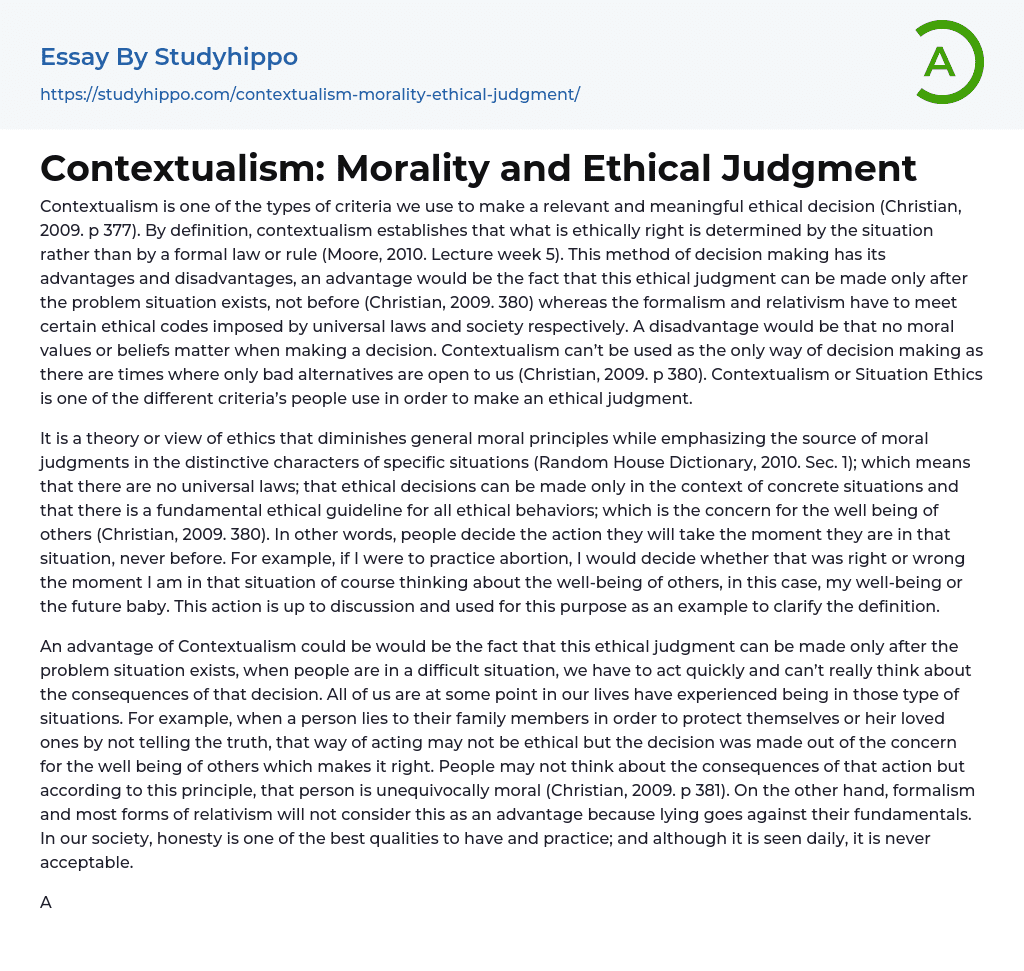Contextualism is one of the types of criteria we use to make a relevant and meaningful ethical decision (Christian, 2009. p 377). By definition, contextualism establishes that what is ethically right is determined by the situation rather than by a formal law or rule (Moore, 2010. Lecture week 5). This method of decision making has its advantages and disadvantages, an advantage would be the fact that this ethical judgment can be made only after the problem situation exists, not before (Christian, 2009. 380) whereas the formalism and relativism have to meet certain ethical codes imposed by universal laws and society respectively. A disadvantage would be that no moral values or beliefs matter when making a decision. Contextualism can’t be used as the only way of decision making as there are times where only bad alternatives are ope
...n to us (Christian, 2009. p 380). Contextualism or Situation Ethics is one of the different criteria’s people use in order to make an ethical judgment.
It is a theory or view of ethics that diminishes general moral principles while emphasizing the source of moral judgments in the distinctive characters of specific situations (Random House Dictionary, 2010. Sec. 1); which means that there are no universal laws; that ethical decisions can be made only in the context of concrete situations and that there is a fundamental ethical guideline for all ethical behaviors; which is the concern for the well being of others (Christian, 2009. 380). In other words, people decide the action they will take the moment they are in that situation, never before. For example, if I were to practice abortion, I would decide whether that was right or
wrong the moment I am in that situation of course thinking about the well-being of others, in this case, my well-being or the future baby. This action is up to discussion and used for this purpose as an example to clarify the definition.
An advantage of Contextualism could be would be the fact that this ethical judgment can be made only after the problem situation exists, when people are in a difficult situation, we have to act quickly and can’t really think about the consequences of that decision. All of us are at some point in our lives have experienced being in those type of situations. For example, when a person lies to their family members in order to protect themselves or heir loved ones by not telling the truth, that way of acting may not be ethical but the decision was made out of the concern for the well being of others which makes it right. People may not think about the consequences of that action but according to this principle, that person is unequivocally moral (Christian, 2009. p 381). On the other hand, formalism and most forms of relativism will not consider this as an advantage because lying goes against their fundamentals. In our society, honesty is one of the best qualities to have and practice; and although it is seen daily, it is never acceptable.
A disadvantage of Contextualism could be would be that no moral values or beliefs matter when making a decision. For example; the ideas of “don’t kill”, “don’t steal”, “don’t lie” and so forth, can serve well as a general rule, but they must be abandoned if the specific situation
calls for it (Christian, 2009, p 380). With that in mind, a person can justify an assassination if that was the “best possible choice”. On the opposite side, the foundation for the Formalism and Relativism is morality.
The decisions we make are based on what the implied natural laws or what the society we live in establishes. This means, the situation comes after not before. Contexualism may be applied in different circumstances where we can’t possibly predict what will happen but it can’t be the only way we make our decisions because there are many times where as there are times where only bad alternatives are open to us in which case only analyzing the consequences or applying morality will help individuals to make us be more ethical.
References
- Christian, J. (Eds. ). (2009). Philosophy: An Introduction to the Art of Wondering. Belmont, CA: Wadsworth Cengage Learning. Pg. 369-388. Fieser, J. (2009, May).
- In the Internet Encyclopedia of Philosophy. Retrieved November 20, 2010, from http://www. iep. utm. edu/ethics/ Moore, W. (2010, November).
- Lecture Week No. 5. Random House Dictionary, (2010). Retrieved Novemeber 22, 2010. http://dictionary. reference. com/browse/situation+ethics
- Values of Life essays
- Ethical dilemma essays
- Normative Ethics essays
- Virtue Ethics essays
- Belief essays
- Deontology essays
- Moral essays
- Virtue essays
- Work Ethic essays
- Acceptance essays
- Age Of Enlightenment essays
- Child Observation essays
- Confucianism essays
- Conscience essays
- Critical Reflection essays
- Destiny essays
- Determinism essays
- Empiricism essays
- Environmentalism essays
- Epistemology essays
- Ethics essays
- Ethos essays
- Existence essays
- Existentialism essays
- Fate essays
- Free Will essays
- Functionalism essays
- Future essays
- Good And Evil essays
- Human Nature essays
- Individualism essays
- Meaning Of Life essays
- Metaphysics essays
- Natural Law essays
- Personal Philosophy essays
- Philosophers essays
- Philosophy Of Life essays
- Political Philosophy essays
- Pragmatism essays
- Reality essays
- Relativism essays
- Teaching Philosophy essays
- Time essays
- Transcendentalism essays
- Truth essays
- Utilitarianism essays
- Adult essays
- Aggression essays
- Altruism essays
- Archetype essays




